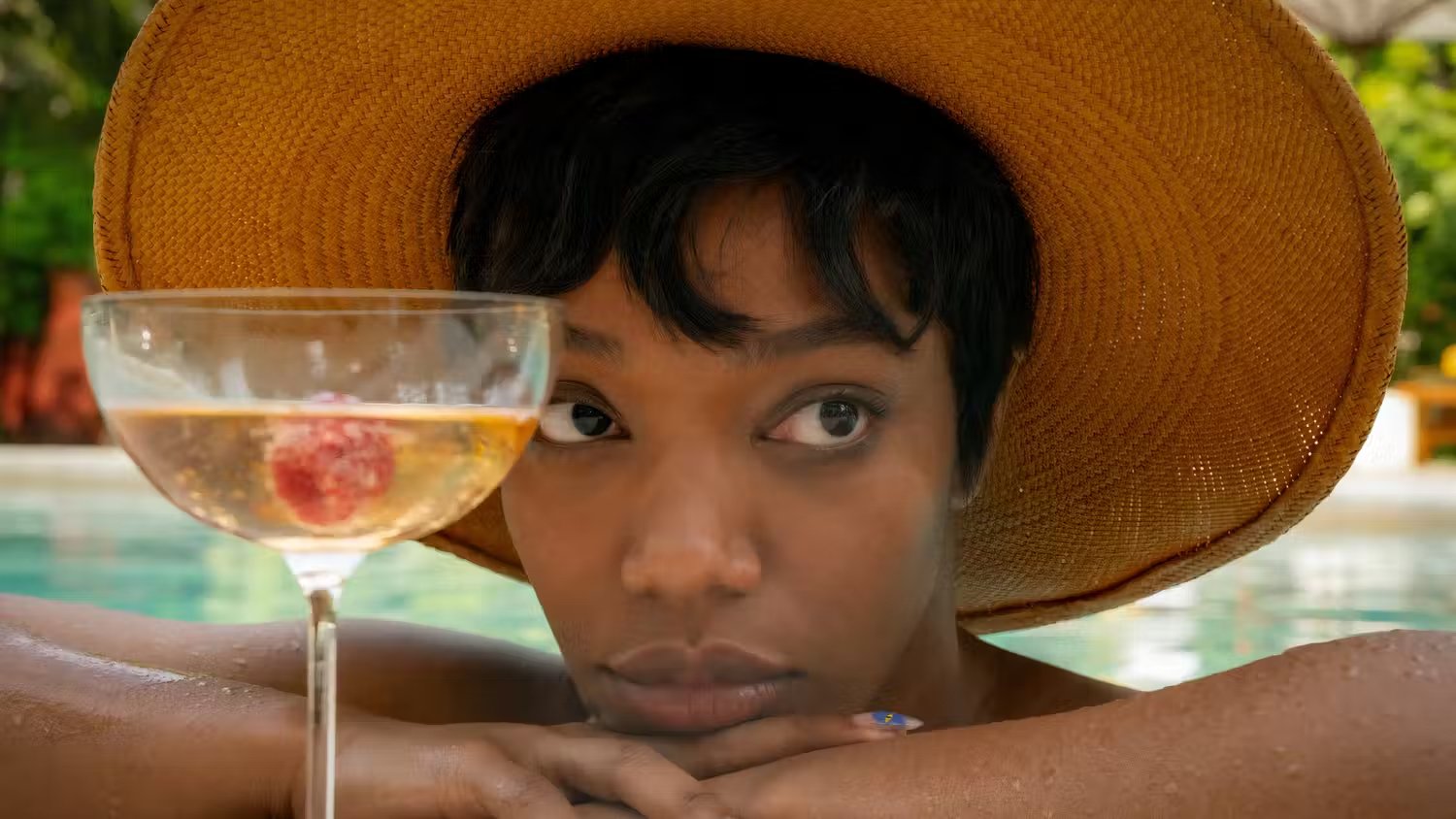Blink Twice: A Shallow Glimpse of Evil
In the 2020s, it feels like every film is trying to say something: about gender, class, violence, capital S Society. Zoë Kravitz’s directorial debut Blink Twice aims to mirror the success of recent social satire thrillers, but is neither smart nor subtle enough to be anything but a total misfire.
We open on Frida (Naomi Ackie) sitting on the toilet in her mold-infested bathroom, face lit by a video of billionaire tech guy Slater King (Channing Tatum) apologizing for unstated misdeeds. In an immediate study of contrasts, the next scene is at that very same billionaire’s sumptuous philanthropic gala, catered by Frida and her roommate Jess (Alia Shawkat in top form as the fizzy, silly best friend). The girls slip out of their cater-waiter uniforms and into cheap gowns snuck in by Frida, and through lucky happenstance end up getting an invite to Slater’s private island.
Channing Tatum perfectly embodies the character of an untouchable tech mogul a la Jack Dorsey and Jeff Bezos, who champions the benefits of intensive therapy and party drugs in the same breath. He's charming and thoughtful, if domineering, and Frida falls for him instantly. Naomi Ackie, meanwhile, plays Frida with an endearing mix of bluntness and aspiration, eyes perpetually wide open in wonder at the extravagance that surrounds her. Frida doesn't fit in —she says the wrong thing, and too obviously wants what comes naturally to those elite creatures around her—but Slater seems to value her candidness and normalcy.
The characters, along with Kravitz’s self-assured direction, take us on a fun ride up until an atonal reveal. Cinematographer Adam Newport-Berra (The Last Black Man in San Francisco, Euphoria) treats us to a primary-colored spectacle on the island, with bright red casitas set against the vivid blues and yellows of nature. Loud snaps, crackles, and pops fill the air as champagne is endlessly poured (by invisible hands), massive blunts are smoked, and Slater’s ever-present vape is used. As Frida settles into a life of idyll, so do we. But snippets of blink-and-you’ll-miss-it (we get it, Zoë) creepiness interrupt the peace: a chef’s knife goes missing, a snake bites Jess, Frida wakes up with dirt under her fingernails and no memory of the night before. Kravitz has her feet firmly planted in both of the movie’s genres during these first two acts, skillfully switching the tone from jokes that warm us to the quirky personalities on screen to tense moments of unease indicating everything is not what it seems.
It’s easy to get swept up in the style and performances, but harder to ignore the lack of any real social commentary in a movie that is, purportedly, intended to comment on society. There’s an abundance of media right now examining class-based power dynamics and the invisible labor performed by the poor on behalf of the rich. Instead of subtly pursuing this kind of thematic exploration, Blink Twice just has the catering manager tell Frida outright, in the first 10 minutes of the movie, that she needs to “smile and be more invisible.” And once on the island, all is equal. Frida and Jess cavort without a care alongside Slater’s buddies, including former Survivor competitor Sarah (Adria Arjona holding her own with a one-note character), two bubble-headed It Girls, and a handful of arrogant men.
Class differences barely resurface as a theme in the rest of the movie. And frustratingly, none of the native islanders serve a purpose outside of moving the story along like video game NPCs, offering a foreshadowing hint here and a plot device there. Kravitz also throws in a half-hearted try at deconstructing internalized misogyny through a rivalry between Frida and Sarah, who compete for Slater’s attention like they’re on The Bachelor. This is quite literally spelled out in a scene where Sarah says she’s always had trouble getting along with other women. Let us read between the lines at least a little bit, Zoë!
Kravitz goes for strike three with an attempted central theme of trauma and abuse, because in 2024 every horror film must be about trauma and every feminist film must be about abuse. Frida and Slater bond over their traumatic childhoods but differ on how they approach that trauma as adults: Slater relies on his psychoanalyst (played menacingly by Kyle MacLachlan) to resurface forgotten memories, while Frida wants the past to remain in the past. With these weighty conversations and Frida’s increasing paranoia after Jess disappears without a trace, Kravitz sets the stage for the big reveal, which hinges—slight spoilers ahead—on extreme cruelty against the women on the island.
This “twist” is jarring, almost a 180 from the fun mystery vibes of the first two-thirds of the movie, and handled so crassly that I almost left the theater before the end of the film. Kravitz and co-writer E.T. Feigenbaum employ violations of bodily autonomy purely for shock value, like it’s a rape-revenge film from the 1970s. And while tension builds to a boiling point as gruesome details are revealed, the climax ends up feeling more exploitative and distasteful than anything else. The plot buckles under this new weight. There’s no time for the gravity of the reveal to sink in and no opportunity for the characters to grapple with the trauma they’ve endured. Instead, the final 20 minutes is a literal assault on the senses as the island transforms from an Eden into a Hobbesian nightmare, where abuse is just a plot device and vengeance the only solution for the traumatized.
This pivot could lend complexity, but Kravitz is less interested in providing a point to the violence and more interested in setting “you go girl” revenge sequences to Beyoncé songs. Worse still, the flippant tone that she successfully deployed in the first half of the movie continues post-twist, tastelessly contrasting with the unsettling details finally shown to the audience. This makes moments that would otherwise have hit hard—including several brutal deaths of women on screen—subject to audience laughter, as they’re undercut by absurdist humor or final-girl one-liners. Not to compare this movie to ones like Parasite or Get Out, but those infinitely better films knew exactly how to strike the balance between satirical inanities and severe violence. Blink Twice is never serious enough to let the full weight of what happens to its characters settle on the audience, instead ricocheting past its distasteful reveal to go full throttle into the bloodiness it hints at from the start.
Kravitz initially titled the movie “Pussy Island” when pitching the movie back in 2017, three years before Jeffrey Epstein’s island entered the public consciousness and just months prior to the #MeToo movement kicking off, and reshaped the story to fit its new cultural context. “This is not a story about empowerment. This is a story about power,” she’s said about the movie. There’s some semblance of power given to at least one of the women by the end of the movie, but that’s only after she—and every other female character—has been thoroughly stripped of autonomy. She learns to play the game for power, sure, but is a plot that adheres to patriarchal rules, with no hint of subversion, anything new? In the end, Blink Twice has nothing to say but the blatantly obvious.
If you enjoyed this article, please consider becoming a patron of Hyperreal Film Journal for as low as $3 a month!




Alix is the editor-in-chief for Hyperreal Film Journal. You can find her on Letterboxd at @alixfth and on IG at @alixfm.